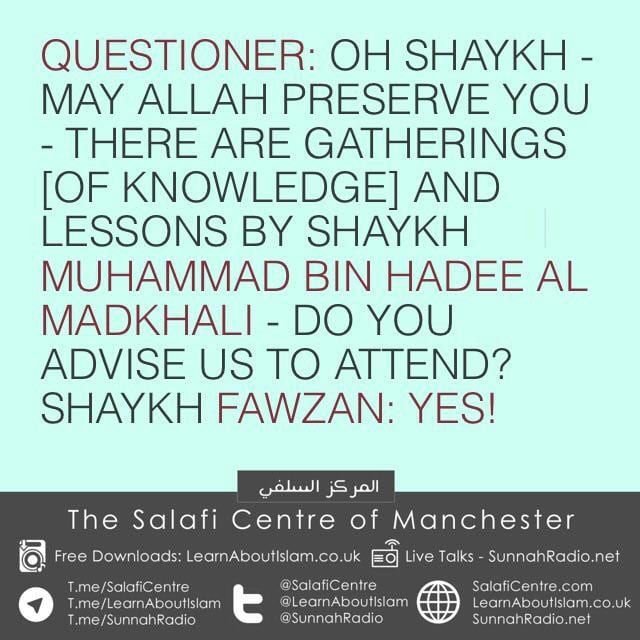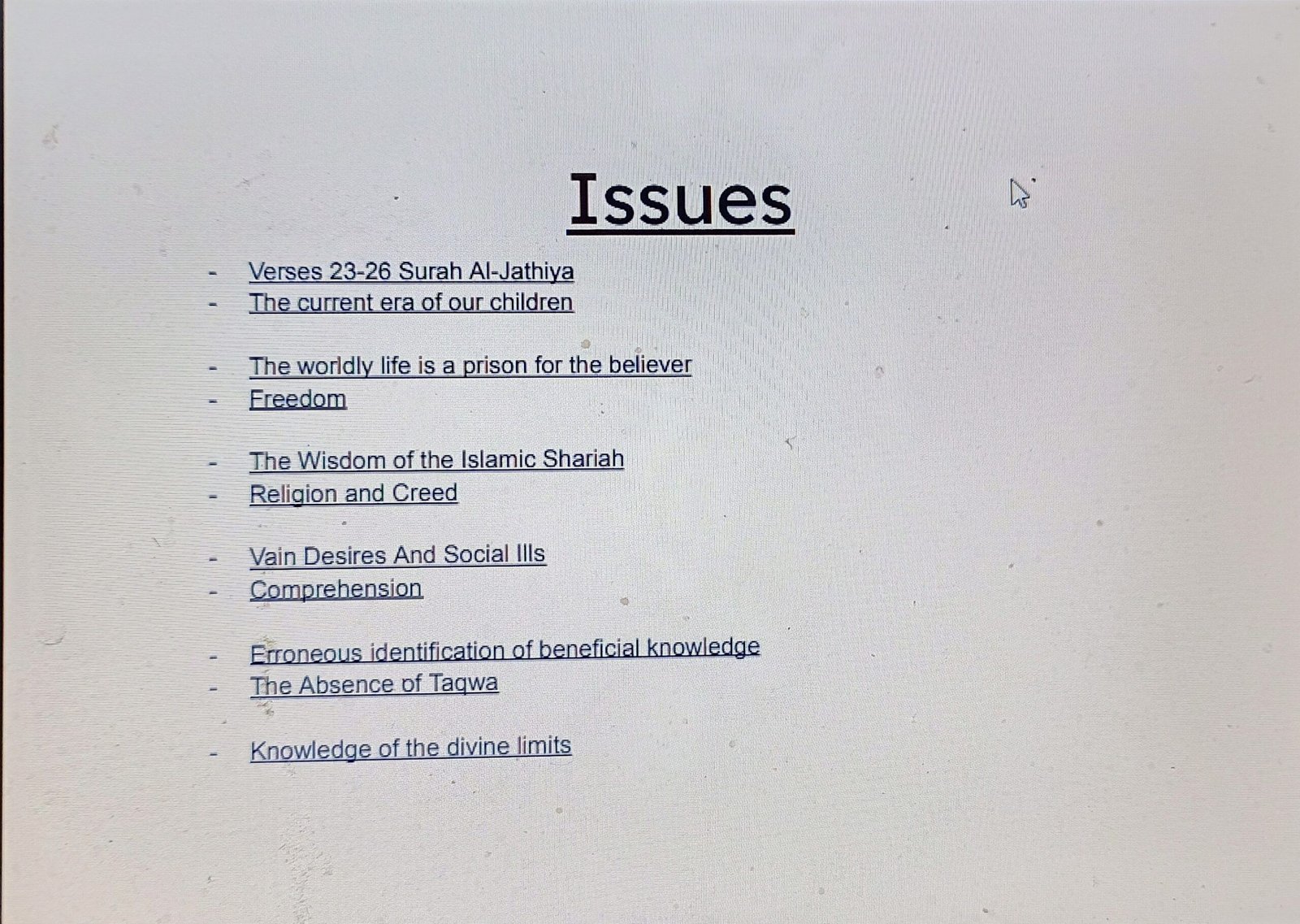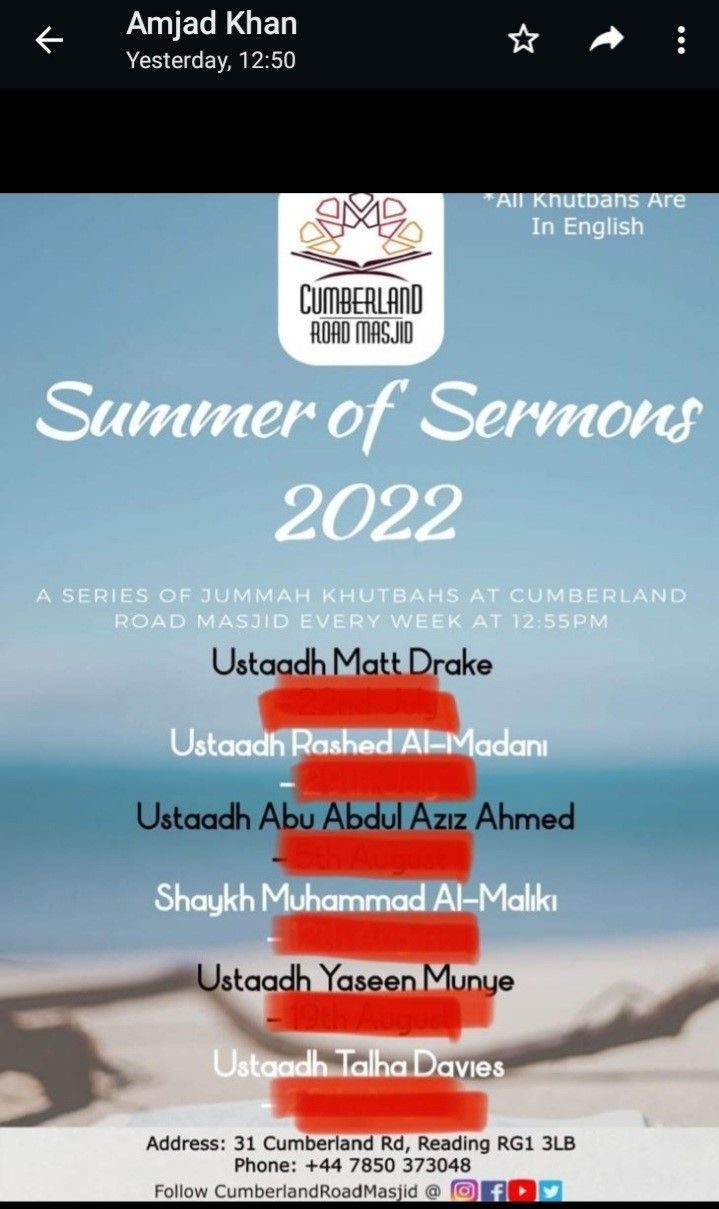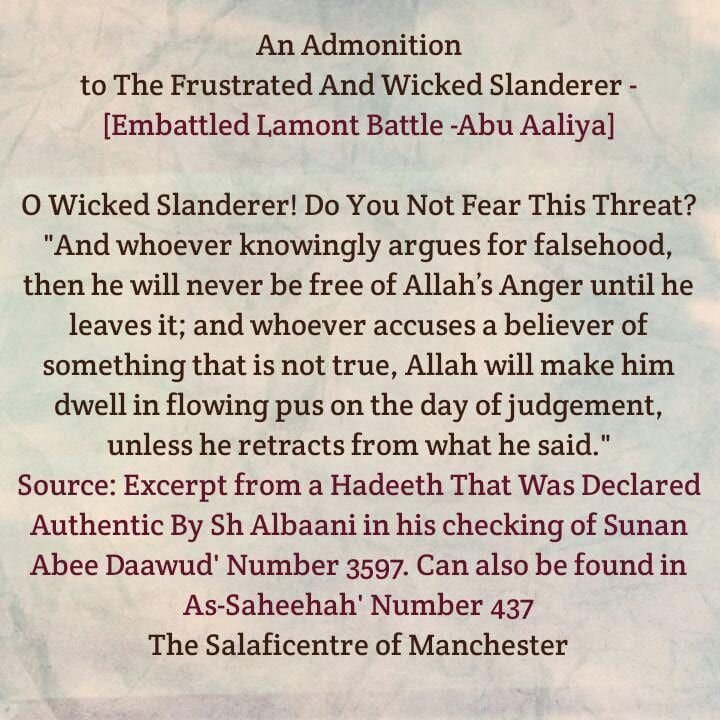All praise be to Allaah, and may His salaah and Salaam be upon our Prophet Muhammad, his family and companions. To proceed:
Allaah (The Most High) said:
يَا أَيُّهَا الَّذِينَ آمَنُوا اجْتَنِبُوا كَثِيرًا مِّنَ الظَّنِّ إِنَّ بَعْضَ الظَّنِّ إِثْمٌ”
”O you who believe! Avoid much suspicion, indeed some suspicions are sins’’
Reader: When one refers to the explanation of this ayah, he finds the likes of Imaam as-Saa’di (rahimahullaah) reminding us that Allaah has forbidden much evil suspicion towards the believers, because when evil suspicion settles in the heart, it may lead one to utter that which is unbefitting and impermissible.
Brother Okasha makes a claim without providing tangible evidences
He said: The Majority of what we call Salafiyyah is nothing else but Philadelphia, and that is Ainul Hizbiyyah (hizbiyyah in actuality), and you are not accepted if you are not part of it
In the lecture of brother Okasha Abdallaah titled Aqeedah Salafiyyah, he threw this above accusation at his adversaries in Philadelphia; however he provided no tangible proofs to back up his claims. He stated that the majority of what is called Salafiyyah is nothing else but Philadelphia and that is hizbiyyah in actuality, and you are not accepted if you are not part of it. He also stated that if you bring a scholar from overseas and he is not from the country that people expect, they reject him; and this Salafiyyah is a kind of hizbiyyah; and that if we do not know this scholar, they are not part of it.
Reader: Firstly: The Messenger (sallal-laahu-alayhi-wasallam) said: “The burden of proof is upon the claimant’’. Shaikh Saaleh Al-Fawzaan (hafidha-hullaah) says that if this door of making claims without proof were left open, then corruption and transgression would have appeared amongst the people, and everyone who desires something from an another person would make a claim.”
Indeed it was incumbent upon him to make a mention of those individuals, groups and organizations guilty of such hizbiyyah in Philadelphia with proofs; because he made a general statement that included everyone who ascribes him/herself to Salafiyyah in Philadelphia.
It is incumbent upon brother Okasha to provide clear proofs to make manifest the affair of those guilty of the grave crime of that Ainul hizbiyyah in Philadelphia; because there are those brothers who are well-known for their clarity upon the Manhajus Salafi.
It is incumbent upon brother Okasha to clarify and detail, as Imaam Ibnul Qayyim (rahimahullaah) stated in An-Nooniyyah that one must detail and distinguish, because unrestricted and general speech devoid of clarification and distinction has caused corruption and led the views and intellects astray in every era.
Shaikh Saaleh Al-Fawzaan (hafidha-hullaah) said that there has to be detailed explanation and the one who is not proficient in detailing (an affair) should keep quiet, because benefit is not acquired from his speech. And every time error occurs its cause is due to an absence of detailed explanation between truth and falsehood. So there has to be detailed explanation and distinction and an absence of mixing up (affairs). Indeed, it may be that there is something of truth and falsehood in an opponent’s statement, so all of it is neither deemed to be false nor truth, rather a distinction is to be made between its truth and falsehood. Therefore, all of it is neither rejected nor accepted; rather a distinction is made between truth and correctness and the falsehood and error in it. And if you are not proficient in detailing (an affair), then you should not enter into this arena. [For further details see: At-Ta’leeqaat Al-Mukhtasar Alaa Al-Qaseedah an-Nooniyyah: Vol: 1 (page: 216)]
Therefore, brother Okasha has to detail, explain and distinguish. He has to produce tangible evidences to support his claims; otherwise his general and unrestricted statements about Salafiyyah in Philadelphia will be viewed as statements that are tantamount to evil suspicion, false accusation, oppression and slander against all those brothers in Philadelphia who are well-known for their clarity upon the Manhaj—those brothers at Masjid As-Sunnah An-Nabawiyyah that have links with the Salafi Mashaa-yikh, such as the likes of Shaikh Rabee, Shaikh Zaid, Shaikh Ubaid, Shaikh Ramzaan and others—those brothers who are visited by the Salafi students and callers, such as the likes of Ustaadh Abu Khadeejah, Ustaadh Amjad Rafiq, Ustaadh Abu Idrees, Ustaadh Anwar Wright, Ustaadh Kashif Khan, Ustaadh Taalib Abdullaah and others.
Secondly: The Salafi mashaayikh who are known to have a strong connection with the Salafi Masaajid and Centres in the West do not know of any hizbiyyah from those brothers at Masjid As-Sunnah An-Nabawiyyah.
Those brothers are not known to be upon the methodology of the false claimants to salafiyyah, such as the likes of the Qutubiyyah, the Surooriyyah and the Haddaadiyyah. Likewise, they are not known to be upon the methodology of the Mubtadia such as the likes of Abul Fitan Al-Maribi, Muhammad Al-Maghraawi, Ali Halabi and others.
Those brothers are not known to cooperate with the people who are known for their erroneous views, such as the likes of Bilaal Philips, Abu Muslimah, Abu Usaamah, Shadeed Muhammad, Ali Tameemi, Zaraboozo and others.
Those brothers do not co-operate with ahlul bidah wal-ahwaa. They do not promote the innovated principles of Hasan al-banna and ikhwaan al muslimeen;
They do not uphold the false Manhaj of Muwaazanah; they do not defend Sayyid Qutb the abuser of the Sahaabah; They do not reject the Jarh Mufassar of the scholars in order to defend figureheads and personalities of bidah.
They do not endorse the false principles: “we do not disparage but we only correct mistakes’’ and “Let’s not make our differing about someone else a reason for differing amongst ourselves.’’
They do not hold onto the mistakes and wrong Ijtihaadaat of the scholars in order to maintain allegiance to a hizb or to reject evidences.
They do not bring doubts in the narrations of the trustworthy narrators; they do not make a differentiation between Aqeedah and Manhaj when the scholars pass judgements against the people of bidah.
They do not call to political parties and they do not hold the evil and false view that the salaf differed in Aqeedah.
They do not revile the scholars of ahlus Sunnah in this time and make the people flee from them; they do not defend those who call the Sahaabah ghuthaa-iyyah.
They do not rush to include the misguided sects, parties and organizations into the arena of ahlus Sunnah; they do not call to the unity of religions, democracy and elections.
Yaa Okhasha! It is incumbent upon you to give details, distinguish and clarify, otherwise your general statements about salafiyyah in Philadelphia are nothing else but statements that are tantamount to speculation, oppression, lies, slander, exaggeration and evil suspicion.
Shaikhul Islaam Ibn Taymiyyah (rahimahullaah) said:
“Speech about the people has to be with knowledge and justice, and not by way of ignorance and oppression.’’ [Minhaajus Sunnah: 4/337]
Likewise, your speech is very vague and implies the following:
(a) That all those who ascribe to salafiyyah in Philadelphia are hizbiyyoon
(b) Those who share the same methodology with those whom you have declared to be upon hizbiyyah are also hizbiyyoon.
So therefore, you should clarify who you intend by your statements so that people are not confused.
Indeed, the Messenger (sallal-laahu-alayhi-wasallam) said: “A person is upon the deen of his friend, so let each of you look at whom he befriends’’ [Al-Ibaanah: 2/439]. Therefore Yaa Okasha! Clarify whether those people visited by the salafi Mashaayikh at Masjid As-Sunnah An-Nabawiyyah are included in your statements or not!
Ibn Mas-ood (radiyallaahu-anhu) said: Indeed a person walks alongside and accompanies the one he loves and who is like him’’ [Al-Ibaanah: 2/476]. Therefore Yaa Okasha! Clarify whether those people visited by the salafi Mashaayikh at Masjid As-Sunnah An-Nabawiyyah are included in your statements or not!
Al-A’mash (rahimahullaah) said: ‘’They (salaf) did not used to ask anything more about a person after having asked about three affairs: Who he walks with, who he enters upon (i.e. visits) and who he associates with amongst the people.’’ [Al-Ibaanah: 2/478]. Therefore Yaa Okasha! Clarify whether those people visited by the salafi Mashaayikh at Masjid As-Sunnah An-Nabawiyyah are included in your statements or not!
If you do not clarify, distinguish, detail and provide tangible evidences for your statements and claims with regards to this affair, then know that your statements and claims are tantamount to slander, lies, exaggeration, fabrication, speculation, evil suspicion and defamation!
And Allaah knows best
Next topic: Brother Okasha said:
If you bring a scholar from overseas and he is not from the country that people expect they reject him, and this Salafiyyah is a kind of hizbiyyah, and that if we do not know this scholar, they are not part of it










